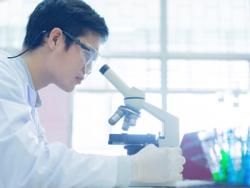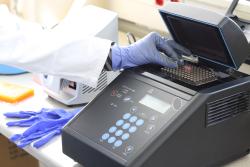
ATF forensic biologists use cutting-edge technology to collect and analyze biological evidence from crime scenes to help solve violent crimes involving firearms, explosives or arson. They also lead trainings, write technical reports and provide expert testimony during court proceedings.
View current openings on USAJobs
In the Field
Biologists are based at the National Laboratory Center in Maryland, and they sometimes deploy throughout the country to support criminal investigations. At the crime scene, they carefully collect and preserve potential evidence on clothing, weapons and other surfaces for further analysis.
In the Lab
In the laboratory, biologists conduct DNA analysis to help find possible leads for investigations. This often involves “touch DNA” analysis or detecting small traces of DNA left behind when an object is touched. Biologists regularly work with damaged or degraded samples, as well as complex mixtures containing DNA from more than one person. They upload the unknown DNA profiles into the Combined DNA Index System and search against a national database to find possible candidates.
In the Classroom
ATF’s forensic biologists provide specialized trainings at the National Center for Explosives Training and Research during Special Agent Basic Training and at various ATF field offices across the nation. They also teach recertification courses for certified fire investigators and National Response Team members.
Outside the agency, forensic biologists instruct classes on evidence collection techniques, contamination prevention, DNA analysis and emerging trends for local, state and federal law enforcement personnel.
Specialized Training and Education

Applicants must have an undergraduate degree with a science concentration in biology, chemistry or a forensic science-related area. In addition, they must have completed college coursework in biochemistry, genetics, molecular biology, statistics and population genetics.
Newly hired biologists must complete ATF’s training program on forensic biology theories and techniques. They learn about the proper collection and preservation of evidence, body fluid identification, DNA analysis methods, data interpretation and statistical calculations. At the end of the program, trainees participate in a mock case and trial. This training can take up to a year based on the individual’s prior experience or training.
As recognized experts in their field, ATF’s biologists participate in research, publish findings and share best practices within the scientific community. They are active members of professional organizations such as the American Academy of Forensic Sciences and the International Society for Forensic Genetics.


